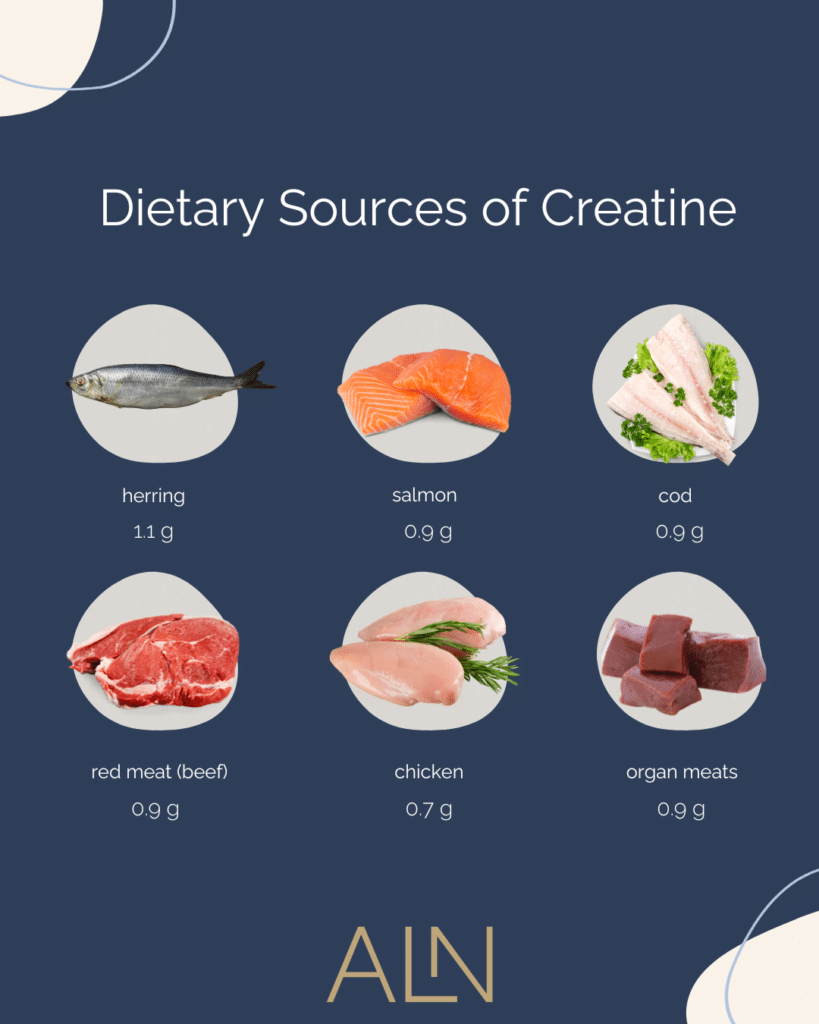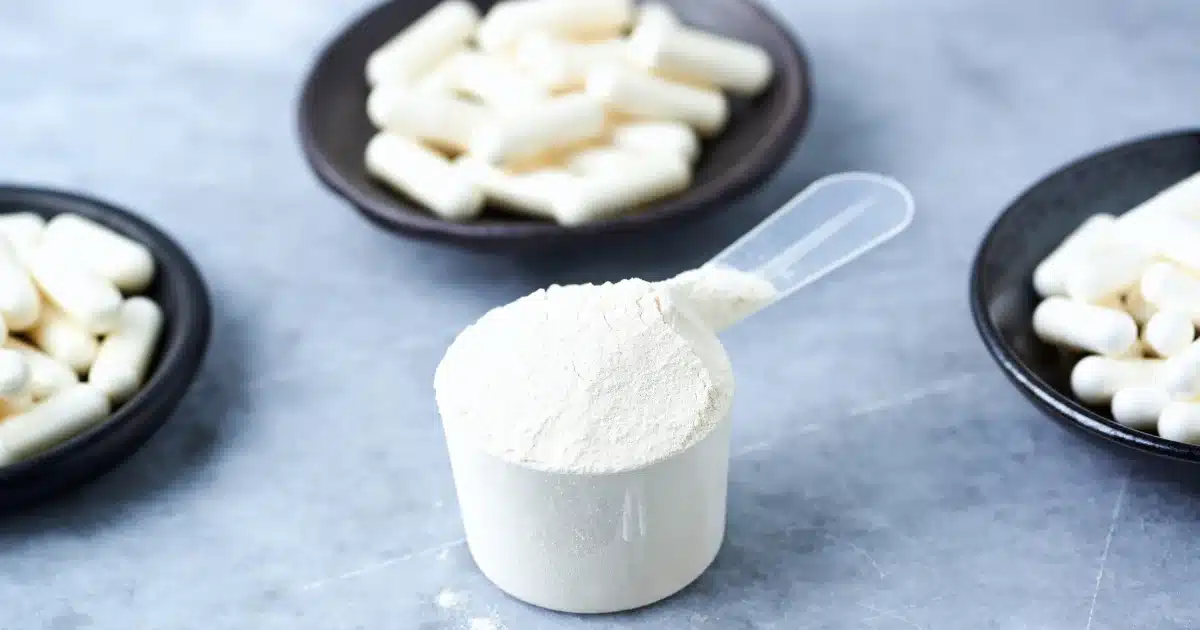RUNNING →
Level Up Your Nutrition Game With Our Freebies
Alex
I provide nutrition coaching for endurance athletes to improve performance and body composition through a simple and flexible eating style.
Hi, I'm
ATHLETE EATING GUIDE →
PROTEIN →
TRIATHLON →
RECIPES →
PERFORMANCE NUTRITION →
SUPPLEMENTS →
HOLIDAY & TRAVEL →
PLANT-BASED →
FEMALE ATHLETE NUTRITION
Explore the Blog
LEARN MORE →
ATHLETE GROCERY SHOPPING GUIDE →
RACE DAY: TRIATHLON NUTRITION PLANNER →
READY TO FUEL?
incredible value!
The fueling guide bundle serves as your one-stop-shop for strategies to fueling before, during and after your workouts.
ENDURANCE EATS
BINGE-WATCH READY!
YOUTUBE SERIES
Within the world of supplements, creatine for runners is one that is highly talked about. Runners have unique and increased nutrition needs due to the high physical demand on their bodies. It is common for runners to seek out supplements, in addition to proper nutrition, to help improve performance.
But is creatine for runners a promising strategy, or are you better off saving your money? Keep reading to learn what creatine is, what types are on the market, and the potential side effects. Consider this your complete guide to all things creatine!
Prefer watching your endurance content? Check out the Endurance Eats Video Series!
Endurance Eats is a video series dedicated to discussing optimal fueling for athletes – triathletes, runners, cyclists, and more!
Make sure to hit that subscribe button to catch future episodes!
IN THIS EPISODE:
(0:00) – Welcome
(1:04) – Sodium bicarbonate for lactate/lactic acid build up
(20:30) – Does creatine monohydrate boost endurance performance?
(33:45) – Green powders for athletes – are they worth it?
What is Creatine and How Does it Work?
Creatine is a type of amino acid, amino acids are the building blocks that make up protein. It is located mostly in your body’s skeletal muscles (95%), as well as in your brain.
Creatine has been a popular supplement among weight lifters and athletes since the 1990s. It is one of the most well-researched supplements (with over 300 research studies currently), which definitely contributes to its popularity. When surveying male Division 1 athletes in 1999, over 48% claimed to be supplementing with creatine!
How does creatine supplement work? When you take a creatine supplement, creatine production starts in your kidneys with two amino acids: glycine and arginine. The product is then transferred to your liver where it interacts with the amino acid methionine to form creatine.
Next, this circulating creatine is brought to your skeletal muscles by small transporters in the cell membrane. The rate at which your body absorbs creatine is determined by your exercise, as well as a variety of other factors.
Overall, it is thought that creatine supplementation increases your stores of phosphocreatine, helping you to produce more energy (in the form of adenosine triphosphate or ATP). Subsequently, your body feels less muscle fatigue and an increase in short-term muscle performance.
Different forms of exercise, such as high-intensity resistance training, rely on your phosphocreatine pathways for energy (ATP). This is why creatine sparked interest in bodybuilders, weight lifters, and other strength-based athletes.

What are the Types of Creatine Products?
Over the years, there have been a variety of creatine products that have hit the market. It can actually be a bit confusing as a consumer to know the differences between them all and which are most effective.
Here are a few of the most popular forms of creatine:
- Creatine Monohydrate
- Creatine Citrate
- Creatine Ethyl Ester
- Creatine Hydrochloride
- Magnesium-Creatine Chelate
- Creatine Malate
While all of these different forms may seem overwhelming, which one you should choose is fairly simple. Creatine monohydrate is the most well-studied form of creatine and has been shown to have the greatest benefits for exercise.
It is also more reasonably priced than many of the other forms, so some say it is the “greatest bang for your buck”.
In my opinion, as an endurance athlete, there isn’t much of a need to worry about the other forms of creatine. Many of them haven’t even been trialed in humans! So it is hard for any company to speak on its effectiveness.
Creatine monohydrate can be bought in a powder form that you mix with your water, or in a capsule form.
Can Creatine Benefit Runners and Endurance Athletes?

Now that you have a bit more baseline knowledge about creatine, you are probably wondering, is creatine for runners an effective performance supplement?
There is a ton of research on creatine improving muscle growth and benefiting anaerobic exercises. Anaerobic exercise involves short bursts of energy, compared to aerobic exercise that uses continuous involvement of oxygen, such as endurance sports.
But, there is currently little research that proves that creatine supplementation is beneficial for improving endurance. Studies that have looked into creatine for endurance sports, found that endurance performance was not influenced.
Bottom line, using creatine during your in-season training as a runner probably isn’t necessary.
Save your money! You are better off purchasing a quality protein powder that contains all of the essential amino acids (including arginine, glycine, and methionine which form creatine) needed to support lean muscle recovery and repair. A typical whey isolate protein powder will include these amino acids, and you’ll be good to go!
Benefits During Off-Season Training
It is important to note that creatine could be beneficial for endurance athletes during the off-season, especially if you are looking to put on lean muscle. If you are performing strength training routines with the goal of muscle growth, creatine supplementation could be a valued tool in your toolbox.
However, make sure to follow the considerations and dosage amounts we list below! As well as talking to your healthcare team before starting any new supplements (as always).
Potential Creatine Side Effects and Timing Considerations
Creatine supplementation doesn’t come without potential side effects and timing considerations. You will want to make sure you keep these in mind!
Potential Creatine Side Effects
- Water retention (bloating). The most common side effect noted was short-term water retention, especially during the early stages of supplementation. Creatine draws water into your muscle cells, which can leave you feeling bloated and/or puffy.
- Weight gain. Since you are retaining more water in your muscles, it is not uncommon to see weight gain in the first couple of weeks. A weight gain of 2-4.5 pounds is typical in the first week of taking oral creatine.
- Liver and kidney complications. When combining creatine with other supplements, or taking larger doses than recommended, there have been noted cases of liver and kidney complications. Sources discuss that if you have a history of kidney stones you will want to be cautious taking creatine. Make sure to discuss with your primary care provider prior to starting a creatine regimen.
- Digestive issues. Another side effect of creatine is potential digestive issues such as nausea and stomach discomfort. This is mainly seen when taking higher doses of creatine, typically above 5 grams.
Creatine for Runners: Timing Considerations
There are timing considerations when taking creatine for runners.
Since creatine can cause water retention and bloating, it could negatively affect your performance during races and training. If you do feel bloated after taking it, you will want to experiment with the timing to make sure it isn’t interfering with your training performance.
Another recommendation is to take your creatine with carbs. This can help to aid with absorption and limit water retention. Mix your creatine with water and eat a bagel with cream cheese on the side or a hearty bowl of oatmeal.
How Much Creatine Do You Need to Improve Performance?
Another common question is how much creatine you need to improve performance. It is thought that a typical athlete’s diet contains around 1-2 grams of creatine/day naturally, which fills up about 60-80% of your stores.
The International Society of Sports Nutrition highlighted their dosage recommendations as follows:
- Start with 5 g of creatine monohydrate (or approximately 0.3 g/kg body weight) four times daily for 5–7 days.
- Once your stores are filled, you can go down to take 3-5 grams/day.
- Larger athletes may need 5-10 grams/day to maintain stores.
The ISSN notes that your creatine stores remain high for 4-6 weeks after stopping the protocol. This is something to consider when thinking of the timing you are taking it!
Dietary Sources of Creatine for Runners

Supplements aren’t the only way to get creatine into your day. You can also obtain creatine naturally from the foods you include in your diet. It is found mostly in meats (red meat and poultry), seafood (fish, but not shellfish), and other animal products.
Here are a few of the highest sources of dietary creatine:
- Herring
- Salmon
- Cod
- Red meat
- Chicken
- Certain game meats (like rabbit)
- Organ meats (like liver)
The ISSN recommends that athletes, especially older adults, aim for 3 grams/day of creatine through diet.

Creatine and Plant-based Athletes
One special group in particular that can benefit from creatine supplementation is plant-based athletes.
Since creatine is present mainly in animal products, vegans and vegetarians are getting very little creatine from diet alone. Studies confirm that plant-based eaters have a lower serum creatine concentration than omnivore eaters.
So if you are eating a primarily plant-forward diet, you could consider experimenting with creatine supplementation to see how it affects your performance. Additionally, you can also optimize your training by making sure you are eating quality plant-based protein sources.
Most creatine supplements are made with 100% vegan ingredients, typically sarcosine and cyanamide which are two organic, vegan molecules.
Still, you may want to double-check the label of your creatine supplement to ensure it fits your dietary preferences. Some supplements use gelatin capsules, which may not be suitable for ethical vegans and vegetarians.
Creatine for Runners: The Takeaway
It is up to you as an athlete to make an informed decision about whether creatine is right for you. If you do decide to experiment with it, my best advice is to wait until the off-season and keep in mind the timing considerations.
Looking to create an eating style that fits into your active, busy life? My Fueling That Fits Course is perfect for you! In less than six weeks, you will build and design a flexible eating blueprint that showcases how to fuel your athlete body. Without interfering with your busy lifestyle! Make sure to check out the course today.
If you are needing more detailed nutritional guidance, our 1:1 premium nutrition coaching has openings available. Click here to apply today!
Alex
I provide nutrition coaching for endurance athletes to improve performance and body composition through a simple and flexible eating style.
Hi, I'm
LEARN MORE →
take the quiz!
Let's discover your Endurance Nutrition IQ
How well do you know your fueling? Answer these questions and let's see where your endurance nutrition knowledge is at!
Take the quiz
level up your nutrition game with these freebies
free downloadS
Protein-Packed 10-Day Sample Meal Plan
Athlete Eating Guide
Athlete Grocery Shopping Guide
1
2
3
Inspiration to fit 120 grams of protein into your day
Planning what goes on your plate
Putting the right foods in your grocery cart
